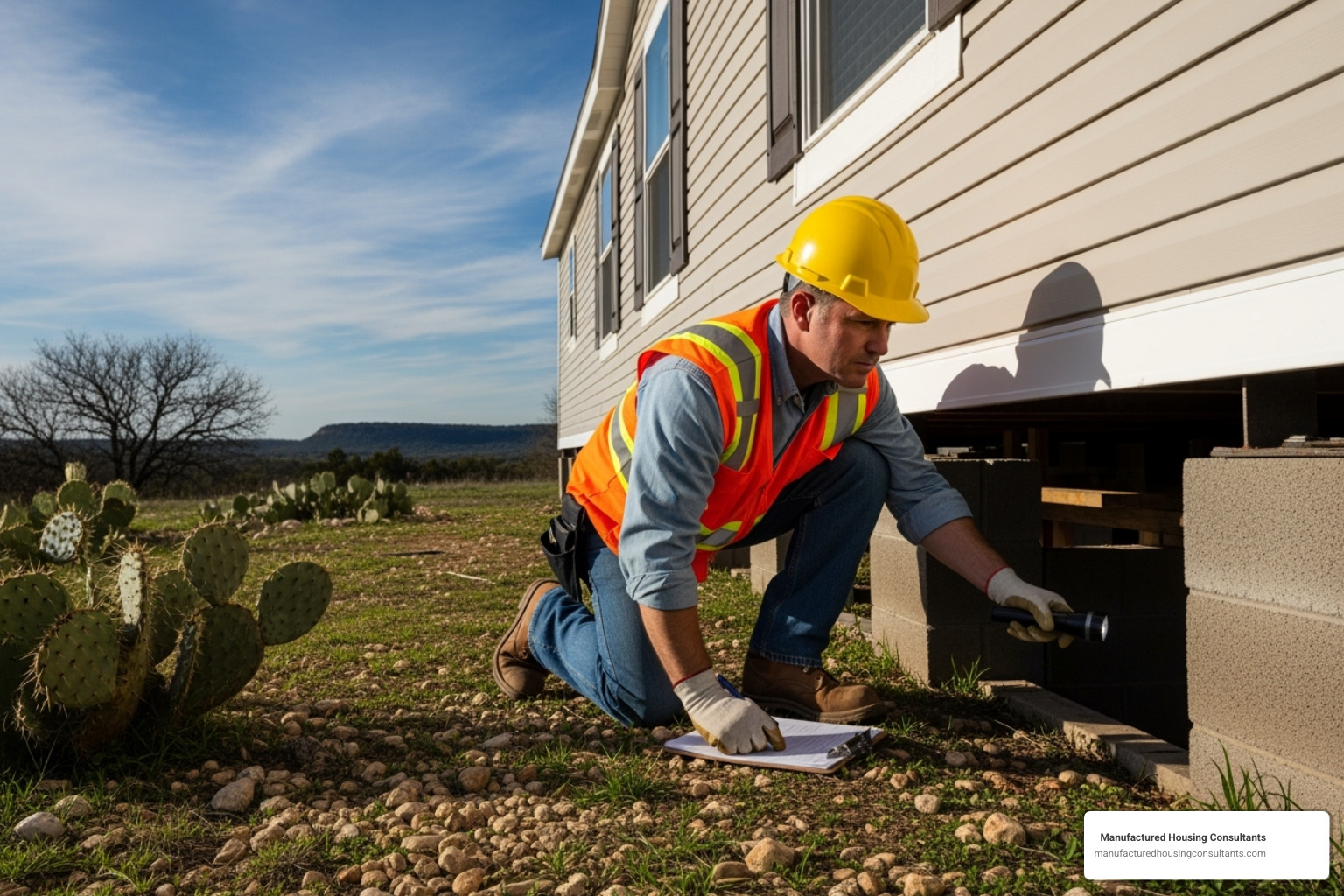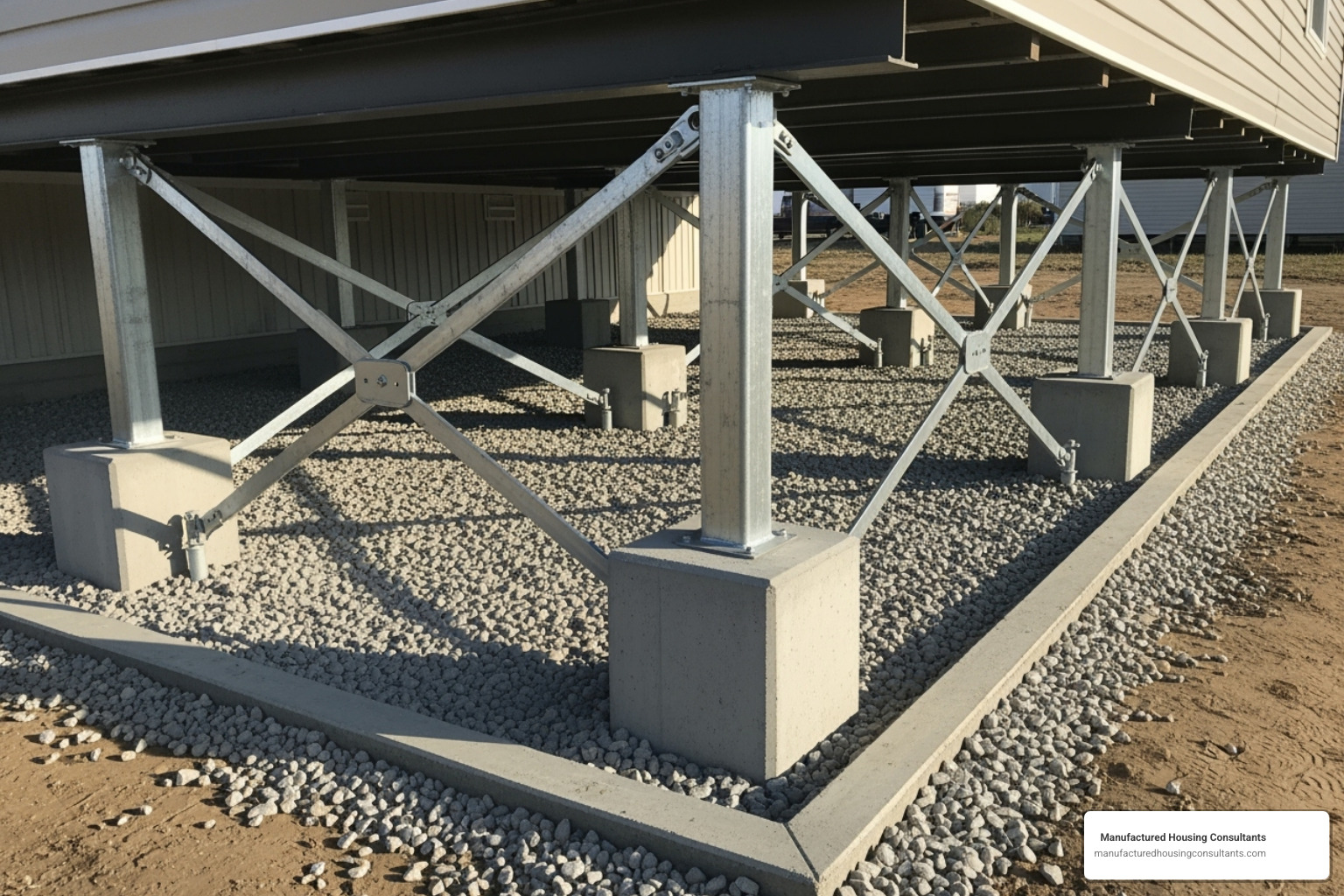Engineer foundation certification: 5 Essential Steps for Safe Loans
Understanding Foundation Certifications for Texas Manufactured Homes

An engineer foundation certification is a legal document from a licensed Professional Engineer (P.E.) confirming your manufactured home’s foundation meets HUD standards. This is a critical requirement for securing FHA, VA, and most conventional loans in Texas, particularly in our service areas like San Antonio.
Quick Answer: What You Need to Know
- What it is: An official certification from a licensed P.E. stating your foundation complies with HUD 7584 standards.
- Who needs it: Anyone financing a manufactured home with an FHA, VA, or conventional loan.
- Who provides it: Licensed Professional Engineers (P.E.) or architects in Texas.
- Cost range: Typically $385-$540 for the inspection and certificate.
- Timeline: Usually 1-2 weeks from inspection to receiving the certificate.
- Required for: Loan approval, homeowner’s insurance, and increasing resale value.
If you’re buying a manufactured home in Texas with financing, you’ll likely hit a roadblock without this certification. Lenders won’t approve your loan until a licensed engineer confirms your foundation is solid. This process ensures your home sits on a permanent foundation, protecting you and the lender from structural failures.
For budget-conscious families in our Texas service areas, understanding this requirement upfront saves time and prevents loan delays. This guide walks you through every step. While we facilitate the process from finding a qualified engineer to submitting your final certificate, it’s important to clarify that Manufactured Housing Consultants does not employ engineers or issue the certifications ourselves. Our role is to connect you with the trusted, independent professionals you need.
What is an Engineer’s Foundation Certification?
At its core, an engineer foundation certification is a formal declaration signed by a licensed Professional Engineer (P.E.) or architect. It confirms that the home’s foundation meets the rigorous standards of the HUD Permanent Foundation Guide for Manufactured Homes (PFGMH – HUD 7584). Think of it as a structural stamp of approval, ensuring the base of your home is sound and secure.
This certification is a legal testament to the foundation’s integrity. It’s an absolute requirement for any FHA-insured loan and is crucial for classifying the home as real estate rather than personal property, which significantly impacts its value and your ability to get financing.
Beyond financing, the certification boosts your home’s resale value, makes it easier to get homeowner’s insurance, and provides peace of mind that your investment is protected against unforeseen damages. In Texas, where weather can be unpredictable, this assurance is invaluable.
Why FHA, VA, and Lenders Require Certification
The requirement for an engineer foundation certification is a fundamental safeguard for everyone involved. For lenders, it’s about risk mitigation. A certified foundation ensures the home is a durable, long-term asset, reducing the risk of structural failure that could devalue the property.
Federal agencies like HUD, the FHA, and the VA mandate these certifications for their loan programs:
- FHA & VA Loans: Both FHA-insured and VA-guaranteed loans require that a manufactured home’s foundation meets the structural stability criteria in the HUD 7584 guide. The engineer’s certification is the non-negotiable proof of compliance.
- Conventional Loans: Most conventional lenders also require a foundation certification to ensure the home is permanently affixed to the land and meets industry standards, protecting their collateral.
These requirements are also rooted in public safety. A properly installed foundation ensures the home can withstand environmental stresses like high winds and shifting soils, common in many parts of Texas. It transforms the home from a movable asset into a piece of real property, increasing its long-term value and stability.
For homeowners, the benefits are clear: it enables loan approval, provides peace of mind about safety, increases resale value, and is often necessary for insurance. For lenders and real estate agents in competitive markets like San Antonio, it ensures smoother transactions and secure investments.
The Step-by-Step Process for an Engineer Foundation Certification

Getting an engineer foundation certification in Texas is a straightforward process when you know the steps. It’s like a specialized home inspection focused entirely on your home’s structural support. The process involves finding a qualified engineer, undergoing an on-site inspection, and handling any necessary repairs.
Finding a Qualified Professional Engineer in Texas
Your first step is to find a licensed Professional Engineer (P.E.) in Texas. This isn’t just anyone with an engineering degree; you need a P.E. with a current license and specific experience with manufactured home foundations. A P.E. license signifies that the engineer has met rigorous education standards (often from an ABET-accredited program), has years of experience, and has passed exams from the National Council of Examiners for Engineering and Surveyors.
When vetting engineers in our service locations like the San Antonio or Von Ormy area, verify their P.E. license with the state board and ask about their specialization in manufactured homes. Ensure they know the HUD Permanent Foundation Guide. It’s also wise to request references and confirm they have professional liability insurance.
At Manufactured Housing Consultants, we connect our clients with trusted, independent P.E.s across Texas who understand both state and federal requirements. It is important to understand that we do not provide these engineering services directly, but rather facilitate the connection to make the process smooth and stress-free for our customers.
What to Expect During the On-Site Inspection
Once you’ve scheduled the inspection, a field technician working under the P.E.’s supervision will visit your home. They will use a detailed checklist based on HUD 7584 standards to evaluate your foundation.

The inspector will examine several key components:
- Foundation Type: They’ll identify your foundation (e.g., slab, pier and beam) and confirm it meets HUD requirements.
- Piers and Footings: The inspector will check for proper spacing, stability, and any signs of cracking or settlement.
- Anchoring System: In Texas, this is crucial. The steel tie-downs that secure your home against high winds will be checked for proper installation, tension, and condition.
- Drainage and Grading: The inspector will assess if the ground slopes away from the home to prevent water damage and erosion.
- HUD Data Plate: This metal tag contains manufacturing information that helps the engineer verify specifications.
- Additions or Modifications: Any additions like porches or carports will be evaluated to ensure they don’t compromise the main structure.
After collecting photos and measurements, the P.E. will review the data and issue either your certification or a report detailing necessary repairs.
What Happens if Your Foundation Fails Inspection?
A failed inspection isn’t a disaster; it’s a detailed to-do list. You’ll receive a non-compliance report that clearly outlines the specific issues, such as inadequate pier support, corroded tie-downs, or poor drainage.
Common problems include:
- Inadequate pier spacing or support
- Insufficient or rusted anchoring systems
- Poor drainage causing erosion
- Settlement or shifting of foundation components
- Unpermitted or poorly engineered additions
With this report, your engineer will help create a retrofit design—a repair plan to bring the foundation up to HUD standards. Your next step is to hire a contractor. While we can offer guidance, please note that Manufactured Housing Consultants does not perform foundation repairs or retrofitting services. You will need to hire a qualified contractor in the San Antonio area who specializes in these repairs. Always get multiple bids and ensure they follow the engineer’s specifications.
After the repairs are finished, a re-inspection is required. The engineer will return to verify that all work was completed correctly. Re-inspections typically cost less than the initial visit (around $195). Keep all documentation of the repairs. Addressing these issues properly allows you to get your engineer foundation certification, secure your loan, and ensure your home rests on a solid, safe foundation.
At Manufactured Housing Consultants, we guide families through this entire process, ensuring your home in San Antonio, Von Ormy, or anywhere in Texas is safe and a sound long-term investment.
Leveraging Your Certification for a Smooth Home Purchase

Receiving your engineer foundation certification is the final step toward homeownership. This document is your proof of a sound investment and the key to closing on your manufactured home. For families we’ve helped in our service areas of San Antonio and Von Ormy, it’s the moment relief and excitement take over.
Finalizing Your Loan and Exploring Foundation Options
Once you have your engineer foundation certification, submit it to your lender immediately. This is the official confirmation they need that your foundation meets HUD standards. With this document, your lender can issue final loan approval, removing the last major hurdle for FHA, VA, and most conventional loans.
You’ll have peace of mind knowing your home is built on a foundation that meets federal safety standards, protecting your investment for years to come.
At Manufactured Housing Consultants, we guide Texas families through this entire journey. We work in San Antonio, Von Ormy, and across the state, partnering with qualified engineers to make the certification process as smooth as possible. We are committed to providing affordable housing solutions for any credit situation, with guaranteed lowest prices and delivery anywhere in Texas. As a clarification, the engineering inspection and certification are services performed by third-party licensed professionals, not by Manufactured Housing Consultants directly. Our role is to coordinate this crucial step for you.
If you’re buying a new manufactured home, this is the perfect time to explore different foundation systems. While any permanent system can be certified if it meets HUD guidelines, some offer unique benefits. For example, a full perimeter foundation can improve energy efficiency, while pier and beam systems are ideal for the sloped lots common in the Texas Hill Country. Understanding your options helps you make an informed decision about your home’s long-term performance.
We encourage you to learn about manufactured home foundation types to see which system best fits your property and budget. Securing an engineer foundation certification not only satisfies your lender but also protects your home’s resale value, proving it was installed correctly and treated as the valuable real property it is.





